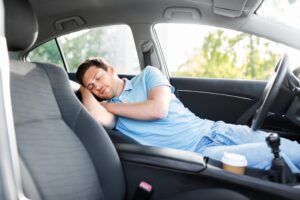
If you drive home after a night of drinking, you may assume that you’re in the clear once you’re home and outside of your car. After all, if police didn’t catch you in the act, you’re in the clear, right? You may be surprised to learn that this isn’t exactly the case. Below, we explain how you can get a DWI even if police didn’t catch you in the act of driving.
DWI After The Fact
There are a number of different ways that you can get a DWI even though police didn’t see you driving. We’re not going to lay out every specific example, but we will cover some of the more common ways that you can run into trouble even though police never caught you in the act of driving if you are under the influence.
The first example involves having “physical control” over the vehicle. We’ve covered what it means to have physical control over a vehicle on the blog in the past, but it essentially means that you were in the driver’s seat with the keys within arms reach. Even if the vehicle is not running, if you are sitting in the driver’s seat with the keys in your lap, you are considered to have taken physical control of the vehicle, and that is all that is needed to arrest someone who is over the legal limit for DWI.
We would obviously work to challenge the arrest, but the law states that you don’t need to be driving to earn a DWI, you simply need to have physical control over the vehicle. So if police catch you sleeping in your vehicle, passed out behind the wheel or simply texting in the driver’s seat with the vehicle off, you could still earn a DWI if you’re over the limit, so make smart decisions and know that this is just one way you can earn a DWI even if police don’t catch you driving.
You can also end up with a DWI if someone calls police and gives them your information and mentions that they believe you are driving under the influence. Now, as we’ve mentioned on the blog in the past, this information in and of itself is not enough to warrant a DWI arrest. In fact, this information doesn’t even equate to probable cause to stop the vehicle and have a conversation with the suspect. However, if police get this information and drive to your house, you could end up facing a DWI if you speak with them and admit to driving home. Absent a warrant, police cannot force you to open your door or talk about your whereabouts before they arrived, so just keep the door shut.
Obviously we’d prefer that you don’t drink and drive, but this is just standard advice for when you are at your home. You do not need to open the door or answer any questions until police have a specific warrant, so don’t help them build a case against you. Oftentimes once you’ve made it home and are inside (so long as you weren’t being followed or police were attempting to conduct a traffic stop), you can legally wait until police come back with a warrant. If you are wondering if you are over the limit, this buffer period should easily allow you to sober up before any interaction would take place. If you do eventually talk to the police, even if you are completely sober, don’t admit to anything that could be used against you, because police can still take legal action based on the totality of the facts.
That last line is the most important piece when it comes to DWIs after the fact. It’s much easier if police see you driving and pull you over, but you can still be arrested for DWI even if they didn’t see you driving based on the totality of the facts. If you ended up in a car accident and were taken to the hospital, you can get a DWI if a toxicology report shows that you are over the legal limit, even if police never saw you driving. All of the evidence in the case will decide whether or not police will move forward with charges.
Of course, we’ll do everything we can to contest that evidence and get your DWI charges dropped. For more information on how we’ll do that, or to talk to a lawyer about a different criminal matter, reach out to the team at Appelman Law Firm today at (952) 224-2277.





